最新外研版高中英语必修三Module3
- 格式:doc
- 大小:55.00 KB
- 文档页数:5



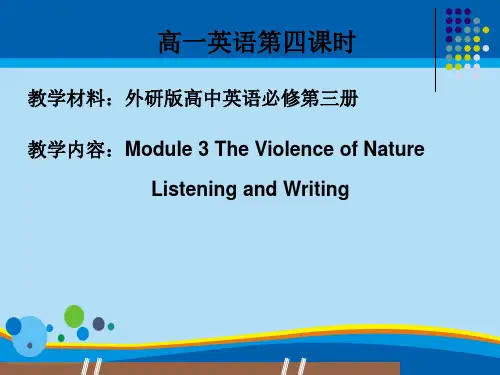
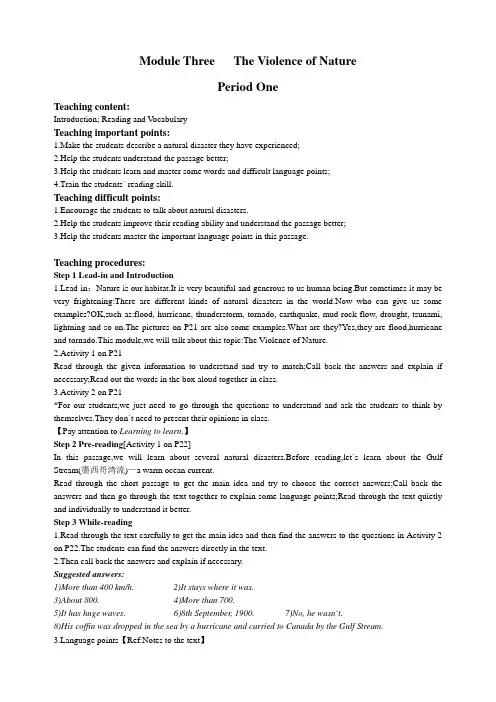
Module Three The Violence of NaturePeriod OneTeaching content:Introduction; Reading and V ocabularyTeaching important points:1.Make the students describe a natural disaster they have experienced;2.Help the students understand the passage better;3.Help the students learn and master some words and difficult language points;4.Train the students` reading skill.Teaching difficult points:1.Encourage the students to talk about natural disasters.2.Help the students improve their reading ability and understand the passage better;3.Help the students master the important language points in this passage.Teaching procedures:Step 1 Lead-in and Introduction1.Lead-in:Nature is our habitat.It is very beautiful and generous to us human being.But sometimes it may be very frightening:There are different kinds of natural disasters in the world.Now who can give us some examples?OK,such as:flood, hurricane, thunderstorm, tornado, earthquake, mud-rock flow, drought, tsunami, lightning and so on.The pictures on P21 are also some examples.What are they?Yes,they are flood,hurricane and tornado.This module,we will talk about this topic:The Violence of Nature.2.Activity 1 on P21Read through the given information to understand and try to match;Call back the answers and explain if necessary;Read out the words in the box aloud together in class.3.Activity 2 on P21*For our students,we just need to go through the questions to understand and ask the students to think by themselves.They don`t need to present their opinions in class.【Pay attention to Learning to learn.】Step 2 Pre-reading[Activity 1 on P22]In this passage,we will learn about several natural disasters.Before reading,let`s learn about the Gulf Stream(墨西哥湾流)—a warm ocean current.Read through the short passage to get the main idea and try to choose the correct answers;Call back the answers and then go through the text together to explain some language points;Read through the text quietly and individually to understand it better.Step 3 While-reading1.Read through the text carefully to get the main idea and then find the answers to the questions in Activity 2 on P22.The students can find the answers directly in the text.2.Then call back the answers and explain if necessary.Suggested answers:1)More than 400 km/h. 2)It stays where it was.3)About 800. 4)More than 700.5)It has huge waves. 6)8th September, 1900. 7)No, he wasn`t.8)His coffin was dropped in the sea by a hurricane and carried to Canada by the Gulf Stream.nguage points【Ref:Notes to the text】Go through the text together with the students to explain some language points.4.Read through the text again quietly and individually to understand it better.Time permitting,listen to the tape and follow it.Step 4 Post-reading[Activity 3 on P22]Read through the given information to understand it and try to match;Call back the answers and explain if necessary;Read out the words in the box aloud together.Step 5 Summary and Homework1.Summary: Summarize what they have learned in this period.2.Homework: Reading on P81-82 in workbook.Appendix: Notes to the text1.occur vi.▲(1)发生[=happen,take place(强调按计划)]e.g:The accident occurred at five o`clock.(=happen)▲(2)想起,想到(与to 连用)sth. occurs to sb. OR It occurs to sb. that clause(主语从句) 某人突然想起…e.g: An excellent idea occurred to me when I woke up this morning.It occurred to me that I would travel Europe.2.They can destroy houses,but leave the furniture inside exactly where it was.▲leave + O. + OC.“使…处于某状态”,宾补可以是介词短语、形容词、分词等。
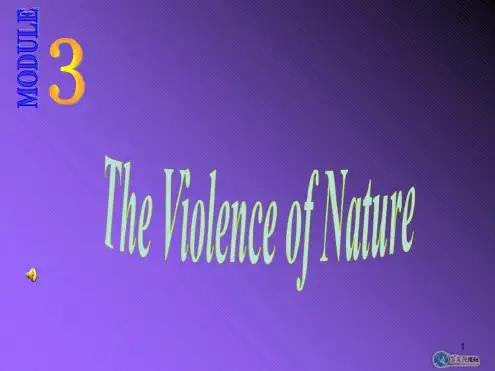
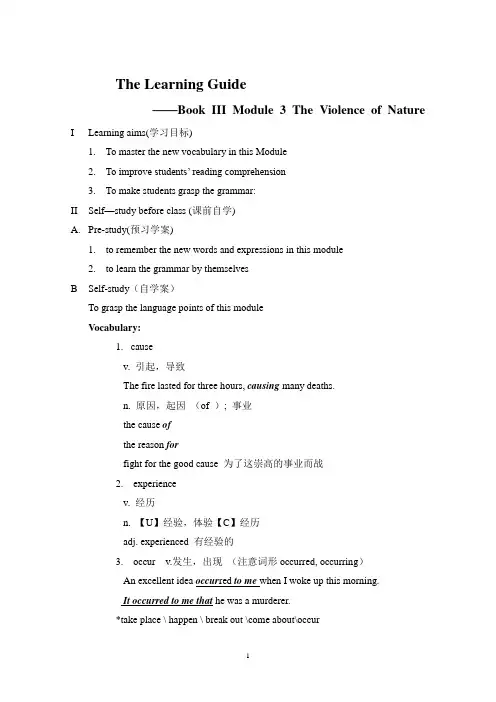
The Learning Guide——Book III Module 3 The Violence of NatureI Learning aims(学习目标)1.To master the new vocabulary in this Module2.To improve students’ reading comprehension3.To make students grasp the grammar:II Self—study before class (课前自学)A.Pre-study(预习学案)1.to remember the new words and expressions in this module2.to learn the grammar by themselvesB Self-study(自学案)To grasp the language points of this moduleVocabulary:1.causev. 引起,导致The fire lasted for three hours, causing many deaths.n. 原因,起因(of ); 事业the cause ofthe reason forfight for the good cause 为了这崇高的事业而战2. experiencev. 经历n. 【U】经验,体验【C】经历adj. experienced 有经验的3. occur v.发生,出现(注意词形occurred, occurring)An excellent idea occur red to me when I woke up this morning.It occurred to me that he was a murderer.*take place \ happen \ break out \come about\occur4. strike v.碰撞击打The stone struck her on the forehead.Strike while the iron is hot.(saying)雷击The tree was struck by lightning.(灾难疾病等的)侵袭(=hit\attack)The area was struck by a terrible earthquake.突然想到An awful thought has just struck me.It suddenly struck me that he was a murderer.留下印象He was struck by her beauty.报时The clock is striking twelve.擦划(火柴)strike a match罢工The teachers are striking for higher pay.*strike \ beat \ hit \ knock5. bury v. 埋葬;埋藏bury sb. aliveHe walked slowly, his hands buried in his pockets.She always has her head buried in a book.bury yourself in sth. 专心致志于……Buried in his work, he didn’t know that all the othershad left.Burying himself in his work, he didn’t know that all the others had left. Phrases:1.refer toIf you want to know his telephone number, you may refer to thetelephone directory.* look up 查询If you don't know a word, you can look it up in a dictionary.I don’t like the way( you referred to )at the meeting.These regulations refer only to children. 这些规矩只适用于儿童。
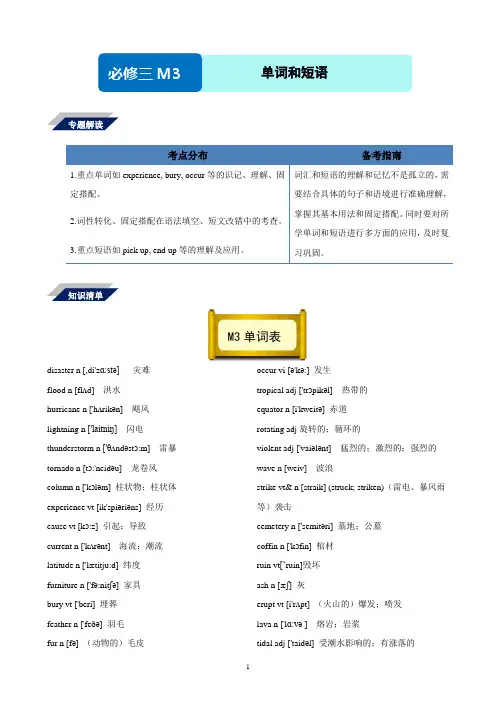
考点分布备考指南1.重点单词如experience, bury, occur等的识记、理解、固定搭配。
词汇和短语的理解和记忆不是孤立的,需要结合具体的句子和语境进行准确理解,掌握其基本用法和固定搭配。
同时要对所学单词和短语进行多方面的应用,及时复习巩固。
2.词性转化、固定搭配在语法填空、短文改错中的考查。
3.重点短语如pick up, end up等的理解及应用。
disaster n [,di'zɑ:stə] 灾难flood n [flʌd] 洪水hurricane n ['hʌrikən] 飓风lightning n ['laitniŋ] 闪电thunderstorm n ['θʌndəstɔ:m] 雷暴tornado n [tɔ:'neidəu] 龙卷风column n ['kɔləm] 柱状物;柱状体experience vt [ik'spiəriəns] 经历cause vt [kɔ:z] 引起;导致current n ['kʌrənt] 海流;潮流latitude n ['lætitju:d] 纬度furniture n ['fə:nitʃə] 家具bury vt ['beri] 埋葬feather n ['feðə] 羽毛fur n [fə] (动物的)毛皮occur vi [ə'kə:] 发生tropical adj ['trɔpikəl] 热带的equator n [i'kweitə] 赤道rotating adj旋转的;循环的violent adj ['vaiələnt] 猛烈的;激烈的;强烈的wave n [weiv] 波浪strike vt& n [straik] (struck; striken)(雷电、暴风雨等)袭击cemetery n ['semitəri] 墓地;公墓coffin n ['kɔfin] 棺材ruin vt[‘ruin]毁坏ash n [æʃ] 灰erupt vt [i'rʌpt] (火山的)爆发;喷发lava n ['lɑ:və ] 熔岩;岩浆tidal adj ['taidəl] 受潮水影响的;有涨落的专题解读知识清单单词和短语必修三M3M3单词表volcano n [vɔl'keinəu] 火山previous adj ['pri:vjəs] 以前的eruption n [i'rʌpʃən](火山的)爆发;喷发possibility n [,pɔsə'biləti] 可能;可能性earthquake n ['ə:θkweik] 地震terrifying adj ['tərifaiiŋ]吓人的;可怕的luckily adv ['lʌkili] 幸运地;幸亏thankfully adv ['θæŋkfulli] 感激地;满怀感谢地hopefully adv ['həupfuli] 满怀希望地;有希望地sadly adv ['sædli] 伤心地;不幸地fortunately adv ['fɔitʃənitli] 幸运地;幸亏warning n ['wɔ:niŋ] 警告worldwide adj ['wə:ld,waid] 全世界的active adj ['æktiv] 积极的;活跃的damage n& v ['dæmidʒ] 损失;损害M3短语pick up 卷起;掀起take off 去掉on average 平均起来end up 以……结束set fire to 放火(焚烧)……catch fire 着火put out 扑灭(火)take place 发生in all 总共;总计项目单词及其词性变化(语法填空必备)重点单词1.disaster n. 灾难2.cause vt. 引起;造成3.bury vt. 埋葬4.occur vi. 发生5.strike vt.& n. (雷电、暴风雨等)袭击6.ruin vt. 毁坏7.active adj. 积极的;活跃的8.damage n.& v. 损失;损害9.experience vt.经历→experienced adj.有经验的10.furniture n.家具→furnish vt.装备;配备11.violent adj.猛烈的;激烈的;强烈的→ violence n.暴力12.possibility n.可能;可能性→possible adj.可能的→impossible adj.不可能的13.terrifying adj.吓人的;可怕的→terrified adj.感到害怕的→terrify vt.使害怕14.luckily adv.幸运地;幸亏→lucky adj.幸运的→luck n.运气15.thankfully adv.感激地;满怀感谢地→thankful adj.感激的16.warning n.警告→warn v.警告重点短语1.pick_up卷起;掀起;拾起;接(某人);偶然学会;情况转好2.take_off 去掉;脱掉;起飞3.on_average 平均起来4.end_up 结果为……;以……结束5.set_fire_to 放火(焚烧)……6.catch_fire 着火7.put_out 扑灭(火);生产;制造8.take_place 发生,进行9.plenty_of 许多;大量10.in_all 总共;总计单元知识预览重点单词短语精讲1.experience vt.经历;体验n.经历;经验[教材原句]Do you know anyone who has experienced one of the events?你认识曾经经历过其中一种事件的人吗?experience in/of在……方面的经验by/from experience 通过经验,从经验中experienced adj. 有经验的;熟练的be experienced in 在……方面有经验[例句研读]①From/In my experience, there are three main reasons why people don't cook more often: ability, money, and time.根据我的经验看,人们不经常做饭主要有三个原因:能力、金钱和时间。
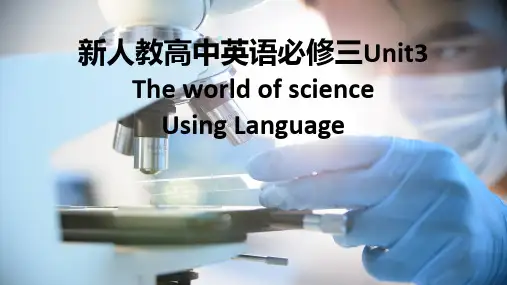

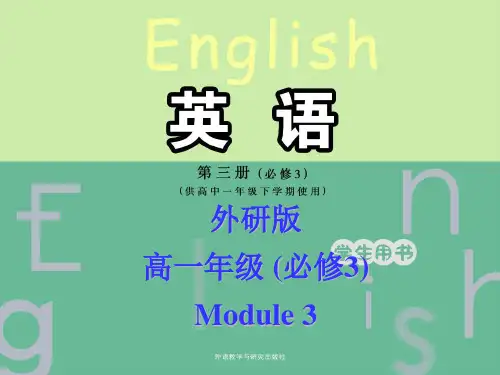
单词1experience n. 经验;实践;经历;阅历v. 经历;经受;遭受;感受experienced adj. 有经验的;熟练的from/by experience 凭经验;从经验中(得出)be experienced in…在……方面有经验【易错警示】experience作“经验”讲是不可数名词,作“经历”讲是可数名词。
2cause n. 原因;动机;理由;根据;目标;理想;事业v. 引起;惹起;促成for a good cause为了正义的事业cause sb to do sth 促使某人做某事【词语辨析】cause和reason(1)cause 指“导致某事发生的原因或起因,常跟of搭配”。
如:We do not yet know the cause of the accident.我们尚不清楚事故的原因。
(2)reason 指“做某事的理由”,常跟for或why引导的定语从句搭配。
如:He has given no reasons for his decision.他并未说明他决定的理由。
【活学活用】(1)Tell me _______________you were so late this morning.告诉我今天上午你来这么晚的原因。
(2)______________________was carelessness.火灾的起因是粗心。
3occur v. 发生;出现;存在;浮现occurence n. 发生的事情,事件;发生;出现sth occur to sb 某事浮现在某人的脑海中;某人想到某事It occurs to sb that/It occurs to sb to do…某人想到……【短语辨析】take place, happen, occur, come about和breakout以上词或短语都含有“发生”的意思,区别如下:(1)take place表示“发生,举行,举办”,一般指非偶然性事件的发生,即这种事件的发生是由于某种原因或根据事先的安排。
单词1experience n. 经验;实践;经历;阅历v. 经历;经受;遭受;感受experienced adj. 有经验的;熟练的from/by experience 凭经验;从经验中(得出)be experienced in…在……方面有经验【易错警示】experience作“经验”讲是不可数名词,作“经历”讲是可数名词。
2cause n. 原因;动机;理由;根据;目标;理想;事业v. 引起;惹起;促成for a good cause为了正义的事业cause sb to do sth 促使某人做某事【词语辨析】cause和reason(1)cause 指“导致某事发生的原因或起因,常跟of搭配”。
如:We do not yet know the cause of the accident.我们尚不清楚事故的原因。
(2)reason 指“做某事的理由”,常跟for或why引导的定语从句搭配。
如:He has given no reasons for his decision.他并未说明他决定的理由。
【活学活用】(1)Tell me _______________you were so late this morning.告诉我今天上午你来这么晚的原因。
(2)______________________was carelessness.火灾的起因是粗心。
3occur v. 发生;出现;存在;浮现occurence n. 发生的事情,事件;发生;出现sth occur to sb 某事浮现在某人的脑海中;某人想到某事It occurs to sb that/It occurs to sb to do…某人想到……【短语辨析】take place, happen, occur, come about和breakout以上词或短语都含有“发生”的意思,区别如下:(1)take place表示“发生,举行,举办”,一般指非偶然性事件的发生,即这种事件的发生是由于某种原因或根据事先的安排。
(2)happen作“发生”讲,一般用于偶然或突发性事件。
另外还可以表示“碰巧”。
常用于搭配:happen to do sth/It happens that…(3)occur作“发生”讲,其意义相当于happen,但它还可以表示“想到,突然想起”。
(4)come about表示“发生,产生”,多指事情已经发生了,但还不知道为什么,常用于疑问句和否定句。
可以构成句型:How did it come about that…?……是怎么发生的?(5)break out意为“发生,爆发”,常指战争、灾难、疾病或者争吵等事件的发生,也可以表示突然大声叫喊等。
【易错警示】上面表示“发生”的五个词或短语,都是不及物动词。
其主语都是事情、事件等。
4ruin v. (使)破产;(使)堕落;毁灭n. 毁灭;崩溃;废墟;遗迹in ruins 成为废墟go/fall/come to ruin 毁灭;灭亡;崩溃;破坏掉【词语辨析】ruin, damage和destroy(1)ruin现在多用于借喻中,泛指一般的“弄坏”,还可指“价值、用途降低或外表损坏”等。
(2)damage多指不一定全部破坏、损坏,可能还可以修复。
它既可作名词,也可作动词。
作名词时常构成搭配:cause/do damage (to…)(对……)造成损害。
(3)destroy指“彻底毁坏掉以至不能或很难修复”。
【活学活用】用ruin, damage或destroy的适当形式填空(1) The rain caused great _______to the crops.(2)A big fire __________the tall building.(3)She poured water all over my painting, and _______it. 5strike v. 打;撞击;碰撞;(突然)袭击;某人突然想到/意识到;让(某人)觉得;留下……印象;擦(火柴);罢工be on strike在罢工go on strike 举行罢工It strikes me that…某人突然想到/意识到……be deeply struck 被深深打动strike sb as…让某人觉得……5strike v. 打;撞击;碰撞;(突然)袭击;某人突然想到/意识到;让(某人)觉得;留下……印象;擦(火柴);罢工be on strike在罢工go on strike 举行罢工It strikes me that…某人突然想到/意识到……be deeply struck 被深深打动strike sb as…让某人觉得……短语精品文档1set fire to放火烧……;使……燃烧make a fire生火put out fire 扑火play with fire 冒大风险;玩火be on fire 燃烧着catch fire 着火;起火set…on fire 放火烧;使燃烧2take place发生;举行in place 在正确的位置;适当out of place 在错误的位置;在不适当的位置in place of 代替in sb's place 处于某人的位置;为某人设身处地地着想take sb's place/take the place of 代替;接替in the first place 首先;第一点3.end up结果为……;以……结束(尤指意料之外的)end up doing/in sth/adj. 以……告终put an end to sth 使某事结束,终止bring sth to an end 使某事结束,终止come to an end 结束;终止on end 连续地;竖着;直立地in the end最后;终于at the end of…在……结束时by the end of…到……结束时为止4.pick up 拾起;拿起;偶然得到(或学到、找到);收听到;搭载;恢复(健康);好转pick out挑选;区分;领会,弄明白pick on 选择(作挨骂或受罚对象);挑中(某人)pick at 一点一点地吃pick off 摘掉;取走英译汉:①Then with a huge effort,she picked it up in her trunk and tried until she was able to place it on a narrow shelf of rock.____________________________________________②I picked up a few words of Greek when I was there last year.____________________________________________答案①之后,她艰难地用鼻子托住它,直到把它放在一块岩石狭窄的边缘上。
②去年我在希腊时学会了几句希腊语。
③The sensors pick up faint vibrations in the Earth.(朗文在线)____________________________________________④We picked up two more English merchants also, and two young Portuguese gentlemen.(选自《鲁宾逊漂流记》) ____________________________________________ 答案③这种传感器能接收到地球微弱的振动。
④我们又让另外两位英国商人和两位葡萄牙绅士上了船。
⑤Under good treatment,Linda is beginning to pick up and will soon recover.______________________________________________ 答案⑤在精心治疗下,琳达逐渐恢复并且将很快康复。
5.put out 扑灭(火);伸出;生产;出版put up with 忍受put up 举起;张贴;建造;支起;为……提供住宿;提名put through 使穿过;接通(电话)put down 放下,使(乘客等)下(车);写下,记下put on 穿上;上演;假装put off 推迟,拖延put aside 把……放在一边,暂不考虑put forward 拨快;推荐;提出put away 收拾;存放①Then I put________the light and scrambled out of the window on to the shed.(选自《哈克贝利·费恩历险记》) ②Never put ________ till tomorrow what may be done today.③Make sure that you put ________every word she says.④Please put those tools ________ after you finish the work.⑤We shall be happy to put you ________when you come to town next month.答案①out②off③down④away⑤up⑥He was not really angry.He was putting it ________.⑦The bus stopped at the station to put ________ one or two passengers.⑧She put ________ the light and closed the door.⑨No longer able to put ________ my toothache,I went to see a dentist.答案⑥on⑦down⑧out⑨up with句型1. On average, there are 800 tornadoes in the US each year, causing about 80 deaths and 1,500 injured.平均来说,美国每年发生800次龙卷风,造成大约80人死亡,1500人受伤。
2. The worst tornado of all time occurred in 1925, affecting three US states: Missouri, Illinois and Indiana.历史上最严重的龙卷风发生于1925年,影响了美国三个州:密苏里州,伊利诺伊州和印第安纳州。